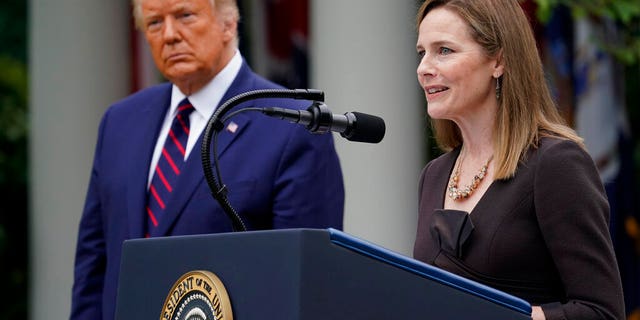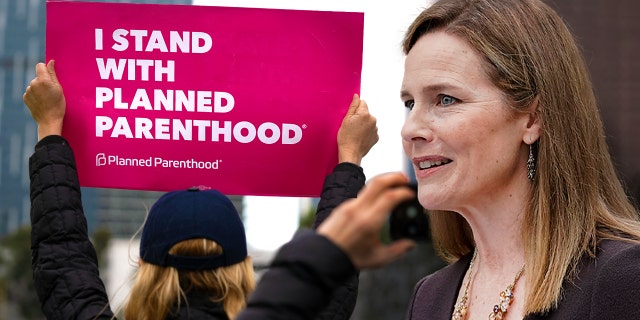For Democratic lawmakers and pro-choice advocates, Judge Amy Coney Barrett’s nomination to fill Ruth Bader Ginsburg’s Supreme Court seat is cause for deep concern.
With Barrett forming a 6-3 conservative majority, many contend that the 1973 landmark Roe v. Wade ruling – granting a woman’s right to terminate a pregnancy – could be undermined or overturned.
So where does Barrett stand on the issue of abortion?
DETAILS OF AMY CONEY BARRETT’S MONDAY CONFIRMATION HEARING RELEASED
For the pro-choice camp, the biggest anxieties stem from a 2006 newspaper advertisement that she did not submit to the Senate Judiciary Committee.
Taken out by the St. Joseph County Right to Life group in Indiana, the two-page ad – signed by then-University of Notre Dame law professor Barrett and her husband in addition to hundreds of other residents – annotated that life beings at “fertilization” and opposed the concept of “abortion on demand.”
“It’s time to put an end to the barbaric legacy of Roe v. Wade,” the ad read. “And restore law that protects the lives of unborn children.”

Judge Amy Coney Barrett speaks after President Donald Trump announced Barrett as his nominee to the Supreme Court, in the Rose Garden at the White House, Saturday, Sept. 26, 2020, in Washington. (AP Photo/Alex Brandon)
On Tuesday, Senate Judiciary Committee Democrats – led by Sen. Dianne Feinstein of California – sent a letter to the Justice Department, seeking an explanation as to why the 14-year-old advertisement was not submitted to the committee as part of the nominee’s questionnaire.
WHERE DOES JUDGE AMY CONEY BARRETT STAND ON THE SECOND AMENDMENT?
But just prior to becoming a federal judge (she currently sits on the 7th Circuit Court of Appeals, after being picked by President Trump in early 2017), Barrett told an audience at Jacksonville University that while she did not think there was the impetus for Roe to be overturned, access to abortion could be restricted.
“The core case – Roe’s core holding that women have a right to an abortion – I don’t think that would change. But I think the question of whether people can get very late-term abortions, how many restrictions can be put on clinics,” she said. “I think that would change.”
Democrats next week are also likely to press down on Barrett’s 2013 essay on the ruling, as a Notre Dame professor.
“If anything, the public response to controversial cases like Roe reflects a public rejection of the proposition that stare decisis can declare a permanent victor in a divisive constitutional struggle rather than desire that precedent remains forever unchanging,” she wrote.
That same year, a Notre Dame Magazine article drew on a lecture given by Barrett, underscoring that she “spoke both to her own conviction that life begins at conception” and to the “‘high price of pregnancy’ and ‘burdens of parenthood’ that especially confront women.”
JUDGE AMY CONEY BARRETT: 5 THINGS TO KNOW
Barrett belonged to the Notre Dame chapter of a pro-life club called University Faculty for Life. In 2016, while the professor was still a member, the group adopted a resolution that “every human being, from the moment of conception and until natural death, must be cherished and protected, and must never be intentionally killed.”
The resolution was written as a rebuff of the university opting to award Democrat Joe Biden a medal, stressing that the then-vice president “has for decades conspicuously rejected Church teaching about life.”
“He has rejected it repeatedly and consistently in the context of abortion, where (he has been quoted as saying) he would not want to ‘impose’ this teaching upon a woman and her doctor,” the resolution continued.
As a federal judge, Barrett has dealt with just a few cases pertaining to the abortion issue.
AMY CONEY BARRETT HEARINGS: HERE ARE THE CORONAVIRUS PRECAUTIONS BEING TAKEN
A three-judge panel voided a request from Indiana, asking the full appeals court to re-evaluate only the state’s provision on fetal remains and not the provisions concerned with prohibiting abortion on the grounds of race, disability, or sex of the fetus.
Barrett sided with her fellow judge’s dissent, which expressed that the law’s provision barring abortion on the basis of race, disability or sex of the fetus was a “eugenics statute,” and that there is a “difference between ‘I don’t want a child’ and ‘I want a child, but only a male, or ‘I want only children whose genes predict success in life.'”
In another case, the panel threw out a Planned Parenthood lawsuit challenging parental notification for minors seeking abortions, declining Indiana’s appeal to review the case.
But even if Roe remains, court observers say there are more than a dozen cases currently permeating in courts across the country regarding abortion issues that could land in the Supreme Court, which could ultimately begin to re-shape the debate.
These range from determining when pregnancy termination should be outlawed (anywhere from six to 10 weeks) to mandates for the burial of fetal tissue and parental notification of hospital admissions.
DEROY MURDOCK: A ‘GINSBURG AMENDMENT’ PLEDGE WOULD UNITE GOP, SPLIT DEMOCRATS
During her confirmation hearing in 2017, Barrett spoke of following the precedent set by the Supreme Court.
“Roe has been affirmed many times and survived many challenges in the court, and it’s more than 40 years old, and it’s clearly binding on all Court of Appeals,” she said. “And so it is not open to me or up to me, and I would have no interest in, as a Court of Appeals judge, challenging that precedent – it would bind.”
When questioned by then-Judiciary Chairman Chuck Grassley, R-Iowa, about her Catholic faith, and whether it is “proper for a judge to put their religious views above applying the law,” Barrett responded: “If there is ever a conflict between a judge’s personal conviction and that judge’s duty under the rule of law, … it is never, ever permissible for that judge to follow their personal convictions in the decision of the case rather than what the law requires.”
AMY CONEY BARRETT’S SUPREME COURT CONFIRMATION SCHEDULE: A TIMELINE
But if she takes a seat on the high court, Barrett will have much greater power to alter the abortion trajectory.
“There has always been an issue over the legitimacy of Roe v. Wade – nowhere is there any clear constitutional directive,” Allan Saxe, a political science professor at the University of Texas at Arlington, told Fox News. “Roe was decided on a vague constitutional amendment – the Ninth Amendment, which obliquely contains ‘right to privacy,’ so justices placed abortion rights within the orbit on privacy, which is dubious at best. If Amy Coney Barrett is confirmed, there likely will be an early state challenge to Roe. To Democrats, Roe v. Wade is a hallmark issue.”
Kelly Hyman, an attorney and Democratic political strategist, believes Barrett potentially would move to “overrule Roe v. Wade,” and “it would be 20 years before that ruling would be overruled.”
DEMOCRATS RESIGNED THAT AMY CONEY BARRETT CONFIRMATION IS INEVITABLE: ‘WE CAN’T STOP THE OUTCOME’
So while anti-abortion groups are staunchly behind Barrett’s confirmation, equally as impassioned are reproductive rights advocates.
“For only the second time since our founding in 1992, the Center for Reproductive Rights is opposing the confirmation of a U.S. Supreme Court nominee,” Nancy Northup, the center’s president and CEO, said in a statement Wednesday. “Her record in opposition to reproductive rights is clear and alarming. Indeed, Judge Barrett has the most extreme record in opposition to reproductive rights as any Supreme Court nominee since the rejected nomination of Judge Robert Bork over 30 years ago.”
Amid the controversy surrounding Barrett’s nomination, Biden stated during an NBC Town Hall earlier this week that, if elected president, he will move to safeguard abortion rights should a Supreme Court nullify Roe v. Wade, vowing to make it “the law of the land.”

Judge Amy Coney Barrett speaks after President Donald Trump announced Barrett as his nominee to the Supreme Court, in the Rose Garden at the White House, Saturday, Sept. 26, 2020, in Washington. (AP Photo/Alex Brandon)
That would be difficult, according to Cristina Antelo, a federal government policy attorney and CEO of political consulting firm FEROX Strategies.
Antelo said a president can only sign legislation passed by both houses of Congress, not change the law on his own.
“Biden is saying he would support it being the law of the land, and should the Senate flip to Dem control in addition to the House remaining in Dem control; then it will be on his policy agenda,” she said. “Presidents can use the power of their pen to make pronouncements through executive orders, much like Trump has tried to do. But as we have learned, there is not much actual power in those.”
CLICK HERE FOR THE FOX NEWS APP
For his part, Trump has maintained that he did not ask and does not know Barrett’s position on Roe v. Wade. In her remarks following her nomination last month, Barrett again vowed to put aside her personal beliefs while on the Supreme Court.
“Judges are not policy-makers,” she said. “And they must be resolute in setting aside any policy views they might hold.”








